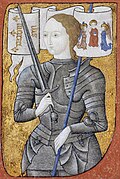Ballade des dames du temps jadis
Poem by François Villon From Wikipedia, the free encyclopedia
The "Ballade des dames du temps jadis" ("Ballade of Ladies of Time Gone By") is a Middle French poem by François Villon that celebrates famous women in history and mythology, and a prominent example of the ubi sunt? genre. It is written in the fixed-form ballade format, and forms part of his collection Le Testament in which it is followed by the Ballade des seigneurs du temps jadis.
| Ballade des dames du temps jadis | |
|---|---|
| by François Villon | |
 The poem in the Stockholm manuscript, late 15th century | |
| Original title | Ballade des dames du temps jadis |
| Written | 1461 |
| Country | France |
| Language | Middle French |
| Subject(s) | Lives of illustrious women |
| Form | Ballade |
| Meter | iambic tetrameter |
| Rhyme scheme | ababbcbC ababbcbC ababbcbC bcbC |
| Media type | Manuscript |
| Lines | 28 |
The section is simply labelled Ballade by Villon; the title des dames du temps jadis was added by Clément Marot in his 1533 edition of Villon's poems.
The women (and man) mentioned in the Ballad
Translations and adaptations
Particularly famous is its interrogative refrain, Mais où sont les neiges d'antan?, an example of the ubi sunt motif,[1] which was common in medieval poetry and particularly in Villon's ballads.[2]
This was translated into English by Dante Gabriel Rossetti as "Where are the snows of yesteryear?",[3] for which he popularized the word "yesteryear" to translate Villon's antan.[4] The French word was used in its original sense of "last year", although both antan and the English yesteryear have now taken on a wider meaning of "years gone by". The phrase has also been translated as "But where are last year's snows?".[5]
The ballade has been made into a song (using the original Middle French text) by French songwriter Georges Brassens,[6] and by the Czech composer Petr Eben, in the cycle Šestero piesní milostných (1951).[citation needed]
Text of the ballade, with literal translation
The text is from Clement Marot's Œuvres complètes de François Villon of 1533, in the Le Grand Testament pages 34 to 35.
Dictes moy où, n'en quel pays, |
Tell me where, in which country |
In popular culture
Summarize
Perspective
The refrain Mais où sont les neiges d'antan? has been quoted or alluded to in numerous works.
- In Der Rosenkavalier (1911), the opera by Richard Strauss to an original German libretto by Hugo von Hofmannsthal, the Marschallin asks, in her monologue toward the end of Act 1 as she considers her own, younger self: “Wo ist die jetzt? Ja, such' dir den Schnee vom vergangenen Jahr!” (“Where is she now? Yes, look for the snow of yesteryear.”)
- In Bertolt Brecht's 1936 play Die Rundköpfe und die Spitzköpfe (Round Heads and Pointed Heads), the line is quoted as "Wo sind die Tränen von gestern abend? / Wo is die Schnee vom vergangenen Jahr?" ("Where are the tears of yester evening? / Where are the snows of yesteryear?") in "Lied eines Freudenmädchens" (Nannas Lied) ("Song of a joy-maiden [prostitute]" (Nanna's song)); music originally by Hanns Eisler, alternative arrangement by Kurt Weill.[8]
- The original 1945 manuscript of the play, “The Glass Menagerie” by Tennessee Williams, contains optional stage directions for projecting the legend “Où sont les neiges d’antan?” on a screen during Amanda's monologue in Scene One where she recounts her (likely exaggerated) past life as a popular Southern belle.
- The poem was alluded to in Joseph Heller's novel Catch-22, when Yossarian asks "Where are the Snowdens of yesteryear?" in both French and English, Snowden being the name of a character who dies despite the efforts of Yossarian to save him.[9]
- Umberto Eco quotes the line "Where are the snows of yesteryear?" in the final chapter "Last Page" of The Name of the Rose.[10]
- James O'Barr wrote "Oú sont les neiges d'antan Villon" in his 1981 graphic novel The Crow" under an image of The Crow lying broken hearted and empty.[11]
- In S2:E9 of Downton Abbey, the Dowager Countess of Grantham, played by Dame Maggie Smith, quotes the refrain "Mais où sont les neiges d'antan?" in its original French, when referring to the father of the present Lord "Jinks" Hepworth, who she knew in the 1860s.
See also
Notes
- "Archipiada" is thought to be Villon’s misremembering of Alcibiades, a friend of Socrates who was reputed to be a model of beauty, and who in the Middle Ages was therefore assumed to be a woman.[7]
References
Wikiwand - on
Seamless Wikipedia browsing. On steroids.












